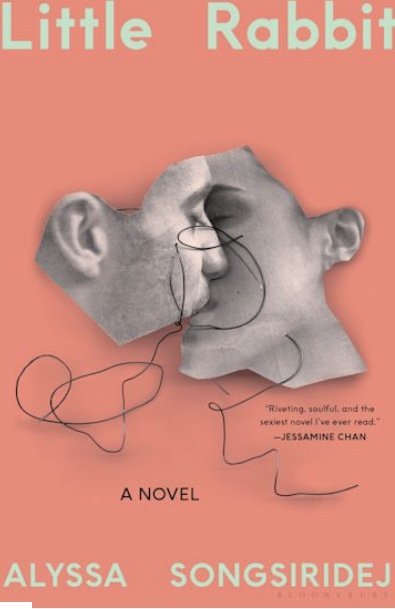Little Rabbit by Alyssa Songsiridej (Bloomsbury Publishing)
She’s thirty. He’s in his fifties. He’s established in his art, a famous choreographer. She’s still emerging into the art she practices, her one novel published by a small press that immediately went out of business. He has a country house in the Berkshires and an apartment with a view in Brooklyn. She lives with a roommate in a Boston suburb. He has a “clean, austere” beauty. She describes herself as “slump-backed and shabby…a hobbity gremlin.” His art is rooted in his body. Hers is within her brain. He leaves bruises behind when they have sex, during which she wears a soft, pink collar. He’s a white cis male. She’s gay, with tinges of bisexuality from encounters with “beta” men; her ethnic background is revealed only in passing, with her description of her mother—”the only Asian American-language poet of her generation.” He calls her Rabbit. She never says his name.
It’s an easy matter to categorize this novel as 9 ½ Weeks meets “Me Too” but Little Rabbit takes every assumption and turns it into confetti. “I’m not exactly Lolita,” Rabbit tells the choreographer at the beginning ot their liaison, “You don’t have to treat me like an egg.” In fact, she’s the one to initiate their sex and she’s the one who pushes to learn what lies on the other side of the choreographer’s “careful force.” She’s the one who’s eager to respond to pain and who demands that the choreographer abandons all restraint. She carries her bruises as though they’re gifts, and from this man who insists she’s “not a summer fling,” they’re reluctantly given to her.
He calls her Rabbit, not because she’s cute and tiny, but because he sees her as “small and wild and determined to survive.” “You have a master’s degree, skills. You can have a desk job, do other things, go anywhere. I can do only one thing,” he tells her. When she insists he rip her dress as they have sex, afterward he says “Let me fix it.” She says, “Break me.” He says “I love you.”
Both of them inhabit different forms of art, his made from physical motion, hers from words, and both of them marvel that the other can “take the thing we all use every day and make it art.” When each brings the other into their own work, they approach a painful boundary. When asked if she uses her husband in her poetry, Rabbit’s mother laughs. “Completely. But he knew what he was signing up for.” The choreographer seems to know that too but Rabbit is unsure.
This is a book about differences in economic class, education, sexual preferences, and age. What it is not about is differences in race. During a time in publishing when #ownvoices is the magic hashtag and fiction relies heavily upon racial identity, Rabbit is a writer, a sexual adventurer, a fierce and independent artist. Her bloodline isn’t one of her markers.
Alyssa Songsiridej makes a bold leap in her first novel. She ignores race and she ignores victimhood. Only in the conclusion does she disclose the names of her puzzling couple, giving them parity without cruelty. Little Rabbit, I promise you, is like nothing you’ve read before. Don’t pass it up.~Janet Brown
